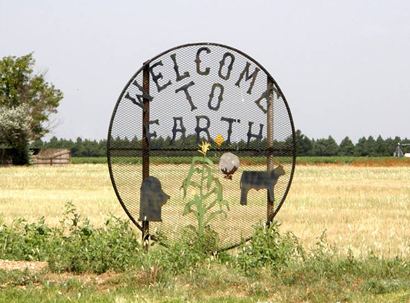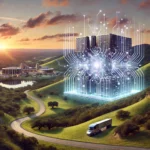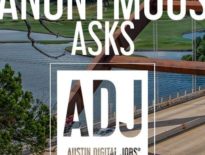
Opportunity
- Education
- Technology
- Entrepreneurs
- Infrastructure
Resulting in Opportunity.
You know that licking of your lips and grasping at air that one does when trying to put in to words a dream. How you think through, as you’re talking with someone, something you just can’t quite simplify. What I’m thinking about is not a dream but a vision. Something magical is happening by way of Austin, Texas and to see it, it seems, requires dreaming; having your head in the clouds so as to look down on everything from 30,000 feet.
This photo, taken by Ralph Arvesen, characterizes Austin more than the famous skyline photos we frequently see. This photo, with the convergence of music, video, people, and graphic design, in a photograph, behind which the thriving downtown is seen overshadowing cranes erecting future, while Samsung GALAXY, the smartphone, adorns the banner, and trees backdrop the concert, this photo is a multilayered glimpse of Austin.
What if we could grasp WHY that’s the case? While we wrestle with the growth, spread, affordability, traffic issues, and frustrations that emerge because of the appeal and demand for Austin, what if we could embrace that it’s happening to Austin because of something incredible?
Austin is Metropolitan
The Domain, the downtown with which we’re not familiar
The Starbucks in West Austin is my perception of Austin and dare I say, to the chagrin of the old Keep Austin Weird culture, I love our Austin. I love my experience with Austin just as much as I love the distinction of 6th street (both sides), The Domain, SoCo, East Austin, the University of Texas campus, Zilker Park, and more. That’s Austin. I don’t care for the fact that we’re doing little to deal with traffic infrastructure as a result of our growth but I will go on record and say that I love that we’re developing Dripping Springs, connected to Georgetown, partners with Cedar Park, looking to San Marcos and Texas State, and beyond.
R.C. Hobbs Professor of Urban Studies at Chapman University in California, Joel Kotkin noted in Forbes our future to an even greater extent: Austin is merely a book end to the fastest growing metropolitan region in the country.
Notes Kotkin, “there is no regional economy that has more momentum than the one that straddles the 74 miles between San Antonio and Austin. Between these two fast-growing urban centers lie a series of rapidly expanding counties and several smaller cities, notably San Marcos, that are attracting residents and creating jobs at remarkable rates.”
OPPORUTNITY
I sat in my Starbucks, on the west side of Austin, lake country, a good 40 minutes from the core of the city, and two students across from me sat soldering a portable Sony speaker to a Raspberry Pi while coding it to play a concerto they wrote. Yes, sitting in Starbucks (I know I just disappointed half of Austin ?). The young man next to me playing a Massively Online Multiplayer war game with a Corsair Gaming headset on, chatting with his teammates; while his friend wrote a book on his tablet. End of the table was a young woman editing a video on her laptop. At Starbucks.
One of the students saw the Galvanize, DivInc, Bunker Labs Austin, General Assembly, The DEC, The Iron Yard, Pitch-a-Kid, Austin Coding Academy, and MediaTech Ventures stickers on my laptop, and asked what I do for a living.
“Create jobs for what you do,” I replied.
Why Austin
People are coming to this region of the country as though fleeing the old world for a new.
That’s precisely what we should be celebrating. As families and professionals leave the coasts as they are, and have been for years, the consistency is that for more than a decade, they’ve been moving to Central Texas.
Since 2001, Kotkin mentioned again in Forbes, Austin’s STEM workforce has expanded 35%, compared to 10% for the country as a whole, 26% in San Francisco, a mere 2% in New York and zero in Los Angeles.
STEM. Is it because of Tech? Is technology what draws folks or is it merely what helps distinguish an economy?
NO.
Let me say that more clearly and loudly: TECH is NOT the catalyst of Austin. Tech is not the draw, the disruption, nor the solution – it fills a gap. Technology evolves, and it is indeed a reason why Austin is experiencing growing pains, but people aren’t leaving Silicon Valley to create it anew, here. What we’re experiencing is the way in which technology plays a role in addressing conflict, inefficiency, and demand. Austin plays a unique role in the global economy and the demand for what we’re doing isn’t because of tech but because of who we really are and how we work.
Consider, when the market needed radio back the last century, Guglielmo Marconi alone didn’t invent and disrupt the status quo. André-Marie Ampère, Joseph Henry, Michael Faraday, Heinrich Rudolf Hertz, and others innovated upon one another to change the world and enable music, news, and discourse as it had never before been possible. The tech didn’t do, the media drove the demand for innovation and the technology responded by way of competition and collaboration to change things for the better.
Austin on the World Stage
And it’s well beyond 30,000 feet that we need to travel to really see what’s exciting about Austin. People from all walks of life, different industries, various origins, and disparate experiences are all coming to Austin to live, visit, or meet, looking to how the world is changing.
The Irish Consulate opened the 2nd (or only 3rd?) office in the United States just off Congress, The Global Chamber, Greater Austin Asian Chamber, the Hispanic Chamber, the Greater Austin Black Chamber, and The Austin Gay & Lesbian Chamber, Austin Young Chamber, and the West Austin Chamber of Commerce are all growing to support the interests and needs our diverse ecosystem. I had the pleasure of recently hosting the Colombian Ambassador to the United States.
And it’s in seeing and thinking about ALL of that, from Austin to San Antonio, that I started to see a pattern.
The reason we’re all drawn to Austin isn’t the startup scene nor headlines that it’s the best place to start a business, it’s that unique in the world is how the arts are colliding with entrepreneurship.
That creates opportunity: innovation, invention, and jobs.
Austin is STEAM not STEM
What do Austin’s live music community, our incredible video game developers, the film producers, directors, and editors, the extensive community of authors, and, even, advertising professionals have in common? Besides the fact that they’re all in Austin… the arts. Media.
And they are all in Austin.
When the last time you saw a film written, directed, and produced from Silicon Valley? How distinguished is Hollywood in advertising? Do you really think of New York when you think about music?
I’m going to throw a curve ball at you and I don’t want you to take it personally if your heart is set on this narrative: Austin is not the live music capital of the world. Austin is the hub of innovation in media. All of it.
Because it’s the misplaced and misunderstood enthusiasm for “tech” WITH what is characteristically Austin, that is drawing people here. To take those risks that make the world a more enjoyable place.
That’s who we are. That’s our future. That creative, culture, and experience, that people have with Austin is WHY everyone wants to be here and too, because of technology therein that we’re creating opportunity, jobs, and resources that drive not just the future of Austin but the world.
Don’t believe me? I call that MediaTech and if you’re familiar with the naming convention (e.g. EdTech, MedTech, BioTech, AdTech) traditional industries all are looking to the role technology plays IN WHAT WE DO – FoodTech, PoliticalTech, FinTech, and more are all the convergences economic development professionals, venture capitalists, and marketers are looking to in finding what careers, companies, and lifestyles look like. And in spite of my (our) use of the word “tech” to distinguish the industry, it’s not really what matters: technology is as ubiquitous as the telephone now in your pocket. It’s the media that is drawing the attention to, opportunity in, and distinction of Austin.
Some time ago, at a great civic event in which I met SaulPaul shortly after the Mayor spoke of Austin’s future, Mayor Adler noted (and in all honesty, I’m recalling his words from memory so if I’m off a bit on your message Mayor, let me know): What is Austin’s Brand?
I’ve been thinking about that for years as telling stories about economies might be the closest thing I have to a hobby (yep, I’m a economy nerd).
I pondered if Austin isn’t where technology is coming to life… eh, sure there is something distinct about the tech but tech alone is not Austin… It’s hard to say that we’re the Live Music Capital of the World when we prevent musicians from entertaining us from the streets while we entertain noise complaints lodged against Austin’s most treasured cultural venues… I considered if it’s that industry’s convergence with tech that is our future, in MusicTech, but then again, most of us aren’t working in music.
We are that though. Music, and Tech, and more through our diversity, and what it strikes me that Austin is struggling with is not our growth and evolution (thanks to tech or not) but rather keeping things as they were.
KUT and Andrew Flanagan recently noted that Austin’s music struggles are a reflection of what’s going on in the rest of the world but it struck me that here we have a difference. Let’s invent the future. To do that we have to teach it and while our schools excel and are embracing technology in K-12, are they distinct in media? What can we do to reinforce our music, art, film, writing, and even video game excellence in elementary school? Formally and institutionally – the high school to which my kids will go has one of the most recognized marching bands in the state – why not also garage bands, youth produced films, and mobile games?
Media, in the U.S. alone, is nearly a TRILLION dollar industry. Compare that to the darling Texas industry brand (Oil & Gas) which is a $1.7 trillion global market – which at the U.S. share of Oil (somewhere around 15% depending on who you ask) is a $255 billion market. With 3 of the 10 largest cities in the country in Texas and the Austin/San Antonio corridor the fastest growing metropolitan region, our future isn’t in oil, it’s becoming very apparent in all the growth than to technology in every other industry, and one of Austin’s leading industries, media / music.
Austin in Entertainment
Not many realize this but everyone’s favorite Shark, Mark Cuban, helped develop the early days of streaming media by way of a little company called Yahoo. Granted, call that 3 hours up the road, I share that to help note that many of us miss the amazing work that has been done in and around where we are. If we can overcome our penchant to “Keep Austin…” we might see the diversity and innovation that stems from here, around here, and distinguish Austin not as what was but as the ideal to which we strive. From the early days of Rock and Roll to the move of Certain Affinity (creator of a couple of small games you might know) to Austin, the distinction of where we are is the innovation of the media that enriches our lives. That’s what we’re about.
I won’t go into the list of companies innovating in music as I’ve done that before, so adding to the C3 Productions, Solstices, and JamFeeds, of Austin, the fact is that EA is here, as is Gary Hoover’s (yes, that Hoover) BigWig Games. KingsIsle Entertainment and Crowfall are Austin game brands and many of us recall the history of Challenge Games and Zynga. On October 12, 2008, Richard Garriott flew aboard Soyuz TMA-13 to the International Space Station as a private astronaut, he created Ultima.
Of course, we’re producing video entertainment as well, and not just producing but celebrating innovation, Austin is actually no more visual media by way of our film studios than it is live music. Film producers, editors, animators, and engineers are looking to Austin to innovate and the broader community is looking to keep every form of media supported and thriving.
Can I burden you with more? Keep in mind, we’re looking at the 30,000 foot view. This is the brief of what’s going on. More than music, Austin is at the epicenter of radio innovation and podcasting. Yes yes Ferris and Rogen, etc. but did you know the Podfather (for essentially having invesnted podcasting), perhaps familiar to some of you as once MTV VJ, Adam Curry, streams No Agenda and The Big Book Show from Austin?
Austin is at the epicenter of innovation in music, video, video games, and radio and that work being done is even more evident in the shift this way of well known, corporate media entities such as Comcast moving their R&D to Austin, Samsung investing in VR and 360 here, Apple AND Google AND Facebook AND Amazon ever expanding their teams and offices…
But let’s not even look to entertainment or companies in such media. What of the great many jobs and work being done to serve that economy.
Austin in Writing
My work in MediaTech Ventures hosted nearly a couple hundred of Austin’s written word thought leaders and technology professionals at WP Engine – WP Engine, the online media company that made it simple for would be website producers and authors to get started.
Scribe Media is based here, for authors, and in Social Media, forget the hype about social networks, Austin is where many of the successful social data companies were built Spredfast, Sprinklr, People Pattern, and Polygraph Media among many looking to what the social graph will do for our future.
SXSW helped me see then when Hugh Forrest mentioned shortly before the world turned upside down, that Music, Film, and Interative would further converge, not as so-distinct events but in reflection of the fact that music and film are intrinsically interactive, engaging, and innovative forms of media.
I’m not going to proclaim the Valley is dead nor even dying. I don’t believe that in spite of many, many, many, many others suggesting so. When I refer to the Valley as the past, what I’m referring to is that Valley built technology and the internet as we know it today. The Valley, largely alone, is responsible for the infrastructure of our economy. And therein is the implication.
When you consider what built the Valley’s tech ecosystem, we have to appreciate that Silicon Valley was engineered. Built by beloved geeks, programmers, data architects, scientists, and engineers, the Valley is the code, platform, and infrastructure on which everything else we’re doing is possible.
Think about it… from Cisco to Netflix, how we use technology today is the result of what the Valley built. We have our social network, our search engine, our analytics platforms, our internet, our commerce engines, our operating systems, our hardware, etc. largely because of Silicon Valley. No, certainly not entirely, but philosophically, the Valley built our past and present by fostering the tech on which we live and work.
Smartphones, search engines, shopping sites, and laptops are merely tools, they are the infrastructure through which we live and work more efficiently, productively, and scalably, but it’s not as though we wake up every morning and depend on Google.
Looking to the future and wherein to get excited is that it’s time to make technology an integral part of lives. We’re starting to see the result of artists, creatives, and other industries embracing that foundation in such a way that technology is becoming part of our lives and it is in Austin where technology is coming to life.
Tech Finding Life in Austin
One of the things you hear about when you visit or move to Austin is that life matters. Austin is an incredibly diverse and supportive ecosystem given the fact that we are equal parts Democrat and Republican, religious and not, liberal and conservative. Those characteristics combined with the Texan sense of independence and Wildcatter attitude fosters a community in which we’re all in it together not just because we’re building companies but because we live here. Together. In spite of differences of opinion, because those differences are our greatest strength. Life matters and your personal opinions comprise who you are more than the technology or company that you’re building and here it matters that you have kids, like to wakeboard, want to spend a week in Port A…
More than that though, Austin’s other brand, other than “Keeping it Weird,” is as the Live Music Capital of the World. Austin is home to artists, musicians, designers, movie producers and directors, writers, and story tellers. Our vibe is the counter culture to Hollywood wherein the Arts are embraced, challenged, and moved forward. Heck, because of our conservative fiscal policies, Elementary schools still have the Arts embedded as a critical component of public education whereas far too many other cities have relegated such experiences to an after school special. While the world chase STEM, to ensure we have more programmers, Austin puts the A in STEAM: Science Technology, Engineering, Austin, and Mathmatics. er… Arts.
The future of our economy lies therein. With the infrastructure engineered, we’re witnessing the new era of technology in Smart Homes, Clean Tech, Internet of Things, Driverless Cars, Wearables, and Personalization – technology that is part of our lives. We’re turning our attention to the complete disruption of archaic industries that matter to our daily lives: Education, Politics, Health, Insurance, Medicine, Transportation, and Energy. We’re dawning an era past algorithms, bandwidth, storage, and big data and entering the era that is dependent upon the very thing that Austin does best: Create Opportunities
New Businesses Create (almost) All New Jobs
In the previous recession, 50 of our internet era’s Unicorns of today were founded and incredible companies such as Disney, EA, Microsoft, and Whatsapp, were all born of such tough times.
And we’ve just gone through some tough times have we now? Moreover, Austin has been a hotbed for startups for the better part of a decade. All of the above, in Education, Technology, Entrepreneurs, and Infrastructure, converged with culture, the arts, and celebrated in Media, creates opportunities.
Opportunities in jobs.
That concerted effort on those 4 things drives economic growth through new industries, new ventures, new jobs, and new founders. Our vision for the better way forward in media, applies to every industry and every sector of our economy.
And to accomplish that, together, challenges us to truly do this together. In Austin.
I want to invite you to join me in such discussions live and together.
Join me online here






Interesting fact: My daughter was the first person born in Earth, Texas in the last 100 years.
For 10 years, I TRIED to start a VC in Austin as there are many entrepreneurs and little money, but now more VC’s are starting in Austin, and I receive NO credit and NO statues nor honorary doctors 🙁
That could explain the sudden frenetic calls from my friends asking for advice on real estate in Austin , ?
Freedom to eat at restaurants, own firearms, keep more of your income. Of folks I know moving to texas its 6 to 1 libertarian /conservative.
There’s probably a range of push and pull factors; you lead with pull factors which are strong positives. The push factors of extremist anti-business ideology of Cal + ridiculous “illiberal liberalism” also play a strong role. Make sure you keep an independent spirit Texas!
I ultimately agree there is opportunity in Austin, but I’d argue the PERCEPTION of opportunity is the draw. It’s a bit like the 49er gold rush… everyone shows up, but that doesn’t mean everyone finds gold.
Over the last 10yrs, I’ve seen a lot of people in the IT world arrive, realize it’s a software-centric tech community (not IT), and ultimately exit with the feeling their personal opportunity wasn’t realized (also wasn’t well conceived). Employers used to think tech talent was cheap in Austin, which hasn’t been the case in a while. The point: it doesn’t really matter what is actually creating opportunity, only that people believe opportunity exists.
Brilliant said and incredibly accurate. I’m reminded about how the Austin community points out (locally) that while the celebrated daily stat of “120 people move here every day,” no one ever points out that 70-80 leave, nor do they ask why or for what *other* opportunity.
Austin has opportunity because it has potential – for SOME.
The opportunity is going to in producing physical products. IMO Austin is returning to it’s roots, where bytes intersect with atoms.
Well done Paul O’Brien. Nicely written….
Cheers Mike. Distinguishing Austin, retaining what makes it unique, preserving the local culture, is far more paramount than I fear most realize.
Interesting to see so many people claim the exodus to Austin as a victory for Texas, rather than the result of concerted effort by Austin to present itself as very politically different to its state.
You’re neglecting that the Dallas, Houston, San Antonio, and even Waco, College Station, Lubbock, and El Paso economies are booming too. Startup scenes in those cities are growing in many ways, faster than Austin did; and are rapidly catching up with some near the point that they’re better places for certain sectors.
I didn’t know so many industries had you in common!
Haha. Isn’t Paul the commonality between us all?!?!
Great piece! Always thoroughly enjoy reading your stuff, Paul.
Creativity
Cheers Paul A. Moorman, let’s find a time to catch up. I want to do a deep dive on Education and EdTech in Austin / Texas. This growth and attention on the region means it’s well past time for more depth and insight to all that makes the economy here so meaningful.
I’m a very conservative guy that moved here from California. I know a lot of liberals out there and a lot of conservatives… I only know of conservatives moving to Texas. I know some of my liberal friends have decided they don’t want to live in a red state anymore and are moving to California as a result of the pandemic.
I suspect we are seeing the greatest political migration since 1670.
Mike H. That’s really interesting. Do you think the others went to Miami, or aren’t leaving at all?
Grant Heinrich I know of no conservatives not planning to leave California actively. There is a reason Ted Cruz won Texas because of California voters and Florida went from a predictable swing state to deep red, same with Ohio. There is some good research on who is leaving blue states and who is moving to them. It’s political migration.
The US is effectively split into three countries that have a geographical separation between two. I think the great American divorce if not a certainty is at least possible.
Austin is the rocking blueberry in Texas.
Austin isn’t that great for getting into Tech. In fact, despite living here for 13 years now and in telecom and then automation the whole time, I now work for a company out of Columbus, OH and when I was job searching almost none of my interviews were with TX based companies.
I dunno if it’s that I can’t compete with applicant pool here or these companies just keep thinking they’ll get unicorns because it’s Austin, either way building a career here in tech isn’t all it’s cracked up to be.
Is it a distinct set of tech skills OR specific sectors that stand out for you as uniquely Austin? Or NOT Austin?
Steve-o and @mcuban said it best: “Texodus!” Ha =)
#Texodus – #Startups – #Jobs – #ThinkDifferent
Earth, TX, is a long way from Austin…
[…] from California and New York to lower-cost areas in the nation’s heartland has drawn investor attention to Texas and Texas-based […]
[…] corridor (a freeway slicing the United States in half from north to south), is the epicenter of the fastest growing metropolitan region in the country, if not the world. The […]
[…] from California and New York, into the central corridor of the county; well-known given the boom of attention on Texas as companies and venture capitalists follow the talent and economics of this region of the […]
Opportunity Hills would be such a better name than Silicon Hills
While sitting in one of our several Mexican restaurants in our tiny Montana town last night a friend asked me where she should take her 17 year old daughter for vacation in the U.S. that has culture and vibrance. They went to New Orleans over Xmas. I said Austin.
Like me, my friend previously lived in Austin. I have lived in Nashville too, but I wouldn’t recommend it for a 17 year old. The cities are often compared but they are completely different in their own ways.
[…] the institutions to do so. Arts, music, and community are woven into Tulsa’s fabric, much like Austin’s weirdness serves as an engine for creative-class entrepreneurship. The city’s size allows for serendipity, […]
[…] underpinnings) just as we’ve seen and I’ve written about in exploring Silicon Valley, Austin, or Manchester – this is how Detroit startups will disrupt traditional sectors […]